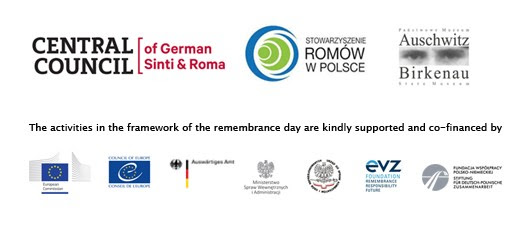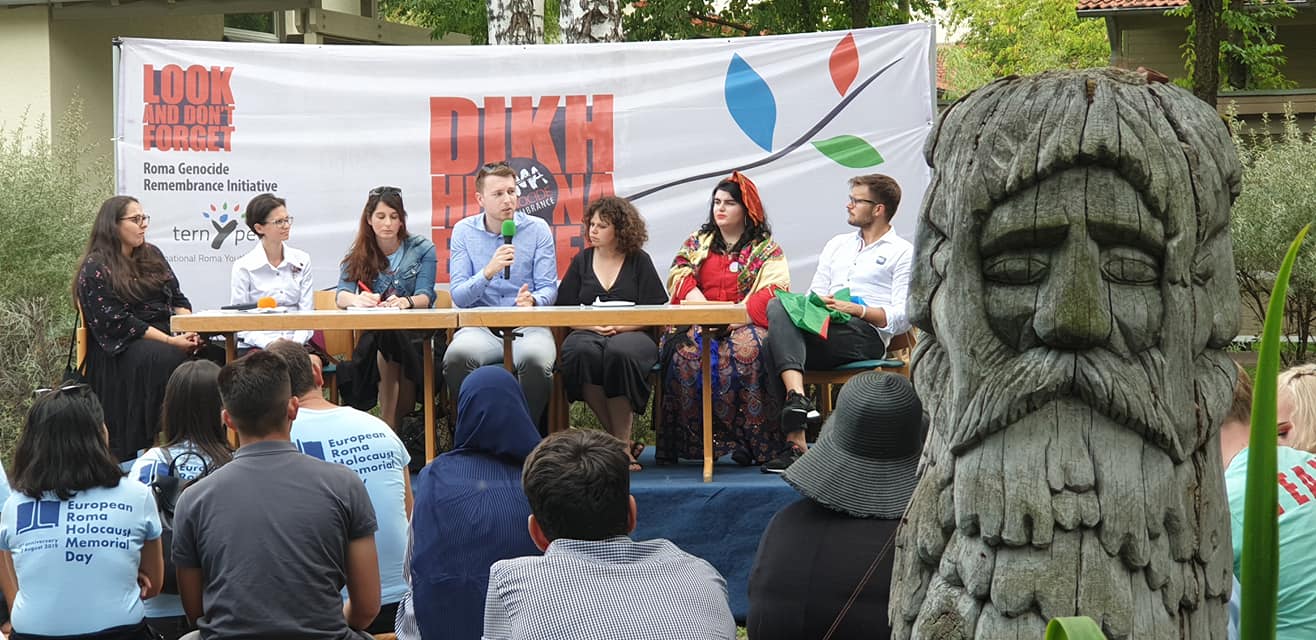On the occasion of the 75th anniversary of the Roma Holocaust, ternYpe International Roma Youth Network and its partners hold its annual international youth event in Krakow and Auschwitz, where a meeting and discussion with Rev. Jesse L. Jackson, former U.S. Senator and civil rights activist and with Roma Holocaust survivors took place.
During the DIKH HE NA BISTER (“Look and don’t forget in Romani”) event, the legendary African American politician had a discussion with over 500 Roma and non-Roma young people from 25 countries, spoke at the conference called “Auschwitz only sleeping” in Krakow and made a speech at a central commemoration in front of the Memorial for Sinti and Roma in the former Auschwitz-Birkenau camp on the 2nd of August.
In 2015, the European Parliament declared the 2 August as the “European Roma Holocaust Memorial Day” to commemorate the 500,000 Sinti and Roma murdered in Nazi-occupied Europe. Every year, the Central Council of German Sinti and Roma and the Roma Association in Poland in cooperation with the Auschwitz-Birkenau State Museum commemorate the persecution and murder of Sinti and Roma during National Socialism with an international commemoration ceremony at the Auschwitz-Birkenau Memorial for Sinti and Roma. This year, Else Baker and Éva Fahidi-Pusztai, Auschwitz survivors, spoke on behalf of the victims*. The commemoration was attended by Holocaust survivors from several countries, as well as high-level representatives of governments, delegations of parliamentarians, representatives of international organizations and the civil society.

DIKH HE NA BISTER – Roma Genocide Remembrance Initiative did bring together 500 young Roma and non-Roma young people from over 25 countries on the occasion of the European Roma Holocaust Memorial Day to advance remembrance, recognition and education about the Roma Genocide. The 6-days lasting event between July 29 – August 4. 2019. in Krakow and Auschwitz was a space of learning about the past, as well as of reflection about the role of young people in Holocaust remembrance. During the event workshops have been held in the Jagiellonian and Pedagogical University of Krakow related to remembrance education, antigypsyism and human rights, moreover Roma Holocaust survivors – Raymond Gureme from France, Ivan Bilashchenko from Ukraine and Krystyna Gil from Poland – shared their stories how they escaped or survived concentration camps.
DIKH HE NA BISTER empowers young people in their struggle for justice and equality, and against antigypsyism and all forms of racism and nationalism in Europe today. In this context, after a central commemoration, an international youth conference was held in Auschwitz youth centre on the 2nd of August afternoon, with the discussion with Vera Jourova, Commissioner for Justice, Consumers and Gender Equality and on with the attendance of Thorsten Afflerbach, on behalf of the Council of Europe.
A roundtable discussion with representatives of European youth networks and structures was held with the aim to reflect on the importance of Remembrance of the Roma Holocaust but also to find ways how different youth groups and youth organizations can build up alliances and support each other in this important role and work. At the closing part of that afternoon, participants could have personal moments in small groups with Roma Holocaust survivors.
DIKH HE NA BISTER was founded by ternYpe International Roma Youth Network and its member and partner organizations in 2010; it is co-organized with the Documentation and Cultural Centre of German Sinti and Roma and with the support of the Council of Europe and the European Commission.
After the central commemoration a ceremony was held by the Central Council of German Sinti and Roma, the Roma Association in Poland and the Auschwitz-Birkenau State Museum where international organizations, parliamentary and governmental representatives had their speeches, among others Dan Doghi, OSCE-ODIHR, Peter Pollack, Slovakian MEP, Soraya Post, former MEP and László Teleki, former parliamentarian.
Throughout the week, participants of the DIKH HE NA BISTER event, visited the Auschwitz Museum and attended the International Conference entitled “Is Auschwitz only sleeping?” Sinti and Roma Narratives after the Holocaust.
The conference took place on 31 July and 1 August 2019 at the Auditorium Maximum of the Jagiellonian University in Krakow and did bring together major stakeholders, artists, advocates, and academics to discuss the representation of Roma memory at the intersection of arts, culture, scholarship, political activism, and the Roma historical narratives and spaces of memory, as well as the civil rights struggle for recognition and against antigypsyism.
Inspired by the quote of Ceija Stojka, a Roma Holocaust survivor and artist, the organizers wanted to reflect on the importance of cultivating the memory of the Roma Holocaust for the safety and well-being of Roma communities today. The international conference was honored to include a keynote speech by Rev. Jesse L. Jackson Sr., the legendary African American civil rights activist and founder of PUSH/Rainbow Coalition.
The international conference was organized on the occasion of the 75th anniversary of 2 August 1944 – the European Roma Holocaust Memorial Day – by the European Roma Institute for Arts and Culture (ERIAC), the Central Council of German Sinti and Roma, the Documentation and Cultural Centre of German Sinti and Roma, and the ternYpe International Roma Youth Network and it was linked to the “Dikh he na Bister” Youth Event”.
The event was accompanied by a contemporary art exhibition, entitled “TEARS OF GOLD/ SOWNAKUNE JASFA”, and curated by Dr. Krzysztof Gil and Dr. Anna Mirga-Kruszelnicka. The exhibition presented the works of artists Małgorzata Mirga-Tas, Valerie Leray, Emilia Rigova, Marcin Tas and Kalman Varady, all of whom deal with the subject of Holocaust memory. Through art they evoke the trauma of World War II, thus giving a testimony to the memory of the Roma Holocaust as a premise to reclaim identity and existence. The traumatic heritage of the Holocaust is transformed into metaphorical gold, which brings the fragmented pieces of memory to put together the scarred yet beautiful Roma cultural whole.
* Short biographies of the speakers:
Jesse Jackson founder and president of the Rainbow PUSH Coalition, is one of America’s foremost civil rights, religious and political figures. A close companion to Rev. Dr. Martin Luther King, Jr., Rev. Jackson has played a pivotal role in virtually every movement for empowerment, peace, civil rights, gender equality, and economic and social justice since the 1960’s. A two-time presidential candidate, Rev. Jackson has led massive voter-registration drives across the South. He was at the forefront of the fight to free South Africa and has traveled the world on missions of mercy, setting hundreds of captives free. On August 9, 2000, President Bill Clinton awarded Rev. Jackson the Presidential Medal of Freedom, the nation’s highest civilian honor. A hallmark of Rev. Jackson’s work has been his commitment to youth. He has visited thousands of high schools, colleges, universities and correctional facilities encouraging excellence, inspiring hope and challenging young people to study diligently and stay drug free.
Else Baker was born in 1935 in Hamburg. After her birth, Else was adopted by Auguste and Emil Matulat. As Else’s biological mother was categorised as “gypsy” by the Nazis, Else was taken by the Gestapo to the Hamburger Freihafen in March 1943. She was supposed to be transported to Auschwitz – Birkenau with other 328 Sinti und Roma, but her adoptive father managed to get her released. In April 1944 she was taken by the Gestapo again and sent to Auschwitz, where she met four of her biological siblings. She survived several months in Auschwitz thanks to an older Roma woman, Wanda Fischer. On 2 August 1944 she was transported to Ravensbrück with one of her biological sisters. All her other siblings were murdered in Auschwitz. Else’s adoptive father constantly struggled to release her, risking his own life. After writing many letters and visiting offices his courageous attempt was successful and he was allowed to take Else home from Ravensbrück in September 1944. Else Baker immigrated to Britain in 1963, and in 2005 she was the first Sinti woman received in audience by the British Queen on the anniversary of the liberation of the Auschwitz Extermination Camp.
Éva Fahidi-Pusztai was deported with her family after the occupation of Hungary by the Wehrmacht on 27 June 1944 from Debrecen to Auschwitz-Birkenau. While the SS murdered her mother and sister in the gas chambers, in mid-August Éva Fahidi was taken to forced labor together with other Hungarian Jewish women in the Münchmühle concentration camp in Hessian Allendorf. Éva Fahidi-Pustzai lives in Budapest today. Her personal memories of the Holocaust were first published in 2004. A year later, a considerably expanded edition appeared in Hungarian. Already on her arrival in Auschwitz-Birkenau on 1 July 1944, Éva Fahidi was confronted with the inhumane conditions under which the Sinti and Roma had to live in Section BIIe. Her descriptions are an important testimony to the murder of the remaining 4,200-4,300 Sinti and Roma on the night of 2 to 3 August 1944.




